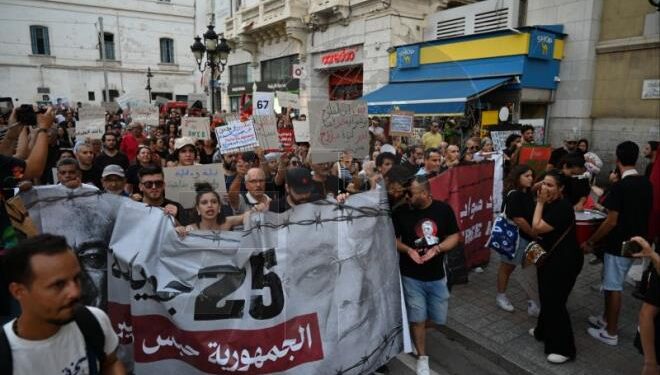Yesterday, Friday, July 25, several hundred demonstrators converged on the place Abdelrahman Ben Khaldoun, in the center of Tunis, at the call of the republican party, the coordination of the families of the political prisoners and the defense committee of the former magistrate Ahmed Souab. Organized on the occasion of the 68ᵉ anniversary of the Tunisian Republic, this rally aimed to denounce the opposition trials and to claim the restoration of a democratic process.
A framed march, a clear message
The movement started from Place Mohamed Ali, the seat of the UGTT, before scrolling peacefully on the Avenues Habib Bourguiba and Paris to Place de la République (Le Passage). All under close police surveillance. Sit-in, slogans, signs: the demonstrators demanded the release of people condemned in so-called “conspiracy against state security”, denouncing attacks on public freedoms and political plurality.
Among the detainees mentioned figure Issam Chebbisecretary general of the Republican Party, sentenced to 18 years in prison. According to his relatives, his trial, just like those of other political figures, would be a logic of repression aimed at neutralizing the opposition.
Opposition figures and climate of tension
Present in the demonstration, Chaima Issaexecutive of the National Salvation Front, also sentenced to 18 years in the same case but in provisional freedom, described a “tense” political context where, according to her, the acquis of 2011 are called into question. She said that this mobilization aims to “recover freedoms and defend fundamental political rights”.
Ahmed Néjib Chebbipresident of the front and brother of Issam Chebbi, took the floor to demand the restoration of the primacy of the Constitution and the abandonment of the “baseless accusations”. Although he was condemned in absentia, he has not to date imprisoned.
Alongside Chaima Issa and Ahmed Néjib Chebbi, several opposition figures were present: Abdelatif Mekki,, Imed Khemiri,, Belkacem Hassanamong others. A rare demonstration of cohesion in a political landscape marked by the output of counterpowers.








